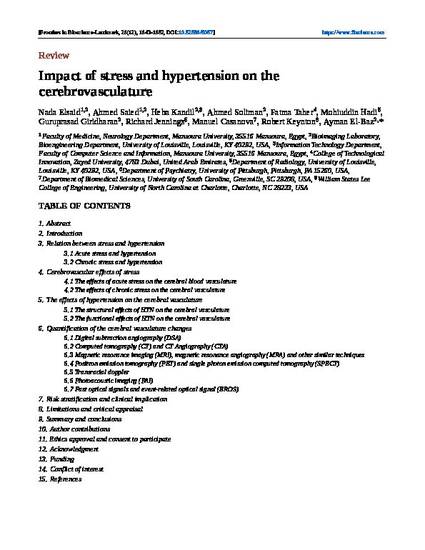
Objectives: Both stress and hypertension (HTN) are considered major health problems that negatively impact the cerebral vasculature. In this article we summarize the possible relationship between stress and HTN. Methods: We conducted a systematic review of the literature using a database search of MEDLINE, PubMed, Scopus, and Web of Science. Results: Psychological stress is known to be an important risk factor for essential hypertension. Acute stress can induce transient elevations of blood pressure in the context of the fight-or-flight response. With increased intensity and duration of a perceived harmful event, the normal physiological response is altered, resulting in a failure to return to the resting levels. These changes are responsible for the development of HTN. Genetic and behavioral factors are also very important for the pathogenesis of hypertension under chronic stress situation. In addition, HTN and chronic stress may lead to impaired auto-regulation, regional vascular remodeling, and breakdown of the blood brain barrier (BBB). The effects of both HTN and chronic stress on the cerebral blood vessels shows that both have common structural and functional effects including endothelial damage with subsequent increased wall thickness, vessel resistance, stiffness, arterial atherosclerosis, and altered hemodynamics. Conclusion: Most of the above mentioned vascular effects of stress were primarily reported in animal models. Further in-vivo standardization of pathological vascular indices and imaging modalities is warranted. Radiological quantification of these cerebrovascular changes is therefore essential for in depth understanding of the healthy and diseased cerebral arteries functions, identification and stratification of patients at risk of cardiovascular and neurological adverse events, enactment of preventive measures prior to the onset of systemic HTN, and the initiation of personalized medical management.
- Cerebrovascular,
- Hypertension,
- Imaging,
- Stress
Available at: http://works.bepress.com/fatma-taher/37/
